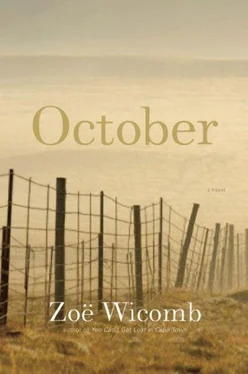It was cruel, he concedes, but now that he has spoken, there is no more to be said. He wants nothing further to do with it, with them. It is the Murrays’ business, not his. Still, he hopes she is well and that Jake is recovering. He heard he was ill.
Fanus’s civility is cutting. Is there no possibility of checking whether, having spoken out of bitterness, he is not now brazening it out? of asking how he knows? But Mercia knows that it is the truth. There is no need to ask, to invite unsavory detail. Perhaps she has hoped to see him for her own purposes, to put behind her the guilt of the past? Now she must choose to believe that Fanus is indeed interested in Jake’s health. She gushes, tells him how lucky they’ve been. Did he know the new sanatorium only eight kilometers out on the N road going north? Well, there was a bed available and Dr. Swemmers managed to get Jake admitted that very afternoon. She, Mercia, has just returned, and yes it won’t be easy the next few weeks, but at least she knows that he is in good hands. Jake has after all done it before, recovered from alcoholism.
Yes, Jake is lucky to have you home, lucky to not rely on state resources, Fanus says, and wishes her good night.

Sylvie, the precocious child, is fearless. The child of three mothers and no father pays little heed to the old women’s sighing and complaining. She keeps out of their way. Out of their sight she practices theatrical laughter. There is plenty to keep her amused as she prises her way into the world that they try to keep at bay. She thinks nothing of crawling under fences, climbing over gates, tearing her pinafore across barbed wire, dismissing the bark of dogs with a mocking woof-woof. The soles of her feet, tough as leather, withstand all but the most vicious of thorns. As for the common, multisided thorn, she brushes that off without wincing. Sylvie is the tomboy who shares with Meester a love of sheep, who as a child ran along to help him herd them into the old concrete dipkraal where he clipped their ears. Sylvie did not fear the stern man as other children did; she held out her hand for him to take, to help her skip across a runnel, a man whose own children were somewhere far away, so that there was no obstacle to swinging the little one onto his shoulders, a child so eager and old-fashioned for her years. Or perhaps that was how he preferred to think of her.
One afternoon, having scaled the chicken-wire fence at the end of the lane, Sylvie found one of Meester’s ewes. The sheep teetered drunkenly, bleated bitterly as if in pain, before collapsing in the sand. Blood came from her rear, and the child watched fascinated, saw that the ewe was in the throes of giving birth. Under the animal’s smooth coat was the unmistakable shape-shifting of a creature desperate to get out, so that Sylvie instinctively played the midwife. She tugged at the tiny, slippery hooves, and helped the lamb to find its way out as the mother shuddered her last breath. With the lamb cradled in her arms she rushed to Meester’s house. He dribbled milk into its mouth, and together they drove off for a baby’s bottle and teat for Hansie. Meester said she could have it — the orphaned hanslam with its adorable black head and hooves — as her very own.
Sylvie held the lamb tenderly in her arms as she fed the little thing, its tail wagging with pleasure. AntieMa said she was not to call the lamb her baby; it was old-fashioned, sinful even, for a girl to think of having a baby. But having delivered the lamb, having seen it all, Sylvie didn’t care. She knew she was Hansie’s mummy, and better than the rag doll that Ousie had made for her, he loved her loudly with a plaintive baa. And she made sure to report to Meester about Hansie’s antics.
Sylvie did not say anything to Meester about Blinkoog, the orphaned kid that Oom Hansie had given her when she was only six. Then her mothers complained, tried to return the gift, but so pitifully did the child wail that they gave in. When Blinkoog was barely a fully grown goat, Ousie sold her to the butcher, for how would they keep her fed in the winter months? Blinkoog’s was not a story to be told.
Why, Sylvie asked, was the old dipkraal there, why did they no longer dip the sheep?
Meester said that all had changed, that the fat-tailed Afrikaner sheep, prone to blowflies, needed antiseptic dips in late spring. Now, in the modern days, the old Afrikaners, herded for centuries by Hottentots, were no longer farmed. No, he laughed, just as we colored people have made progress — we no longer need the fat rumps of the Hottentots to see us through the lean months — better sheep are being bred, ones that don’t succumb to pests and disease. Meester explained the crossing of Blackhead Persians with the Horned Dorset, and how the new Dorper breed was chosen from those with black heads and white bodies. And that Sylvie should not like some backward, uneducated people think that this went against God’s will. Oh no, it was clear that God had sanctioned the breeding. Dorpers were Chosen Sheep. Chosen for this arid veld where they’d eat anything, chosen for their fecundity, and for being such good mothers. Besides, they did not need shearing, and even the rich sheep farmers were no longer interested in wool. Who needs wool when people prefer the new, more convenient fabrics like nylon? The Dorpers grew so fast, and their mutton was so good, that clearly the breeding had been sanctioned by God.
Sylvie had no fear of contradicting Meester. She did not think that Hansie’s mother had tried hard enough. Without her, Sylvie, the old ewe would have kicked the bucket without caring about the baby desperate to get out. Also, nature had not always done so well by the Dorper. Look she said, how their coats are shed in early summer. She laughed, pointing at the weird-looking old ram who was kept tethered away from the ewes. His woolen hair had fallen out from the legs upward, and what remained was a tattered karos that seemed to have been flung carelessly over his back, making him look ugly and foolish. Not ugly at all, Meester said, involuntarily patting the bald patch at the back of his own head. Mother Nature knows what’s good for him, and I daresay there’s a beauty in such a practical arrangement when it’s still cool in the evenings, and something flung over the shoulders is just what he needs until the temperature is right. Then he’ll shed the last of the wool and look as handsome and dignified as any shorn ram.
How the child loved to hear Meester’s stories about sheep. Sheep, he said, were the favored animals in the Bible. On the Day of Judgment, when the Son of Man comes in all his glory, he will separate the nations, one from another as sheep are separated, and he will place the sheep at his right hand.
So, will goats be cursed, will they weep and gnash their teeth? she asked. Meester wasn’t clear about that. He shook his head and tutted; he said it just wasn’t worth bothering with the less advanced creatures. These Namaqua people won’t develop until they give up goats. He may have started out with goats but it is clear that Dorper sheep are the way forward. Sylvie understood that Meester did not include her in the backward people, and to show her discernment she reminded him of the wolf in sheep’s clothing. She would know the difference, she said confidently; she was no Red Riding Hood.
She liked hearing Meester’s story of the foolish Dutch king, William of Orange, who sent the first woolly merinos to South Africa — that’s how they landed here — and then the next year asked for them back because, he claimed, they had been sent in error. What kind of king was that who changed his mind? Or who made mistakes and then thought the act could be undone? And now, who needed merinos when scientific knowledge had produced the Dorper?
Читать дальше













